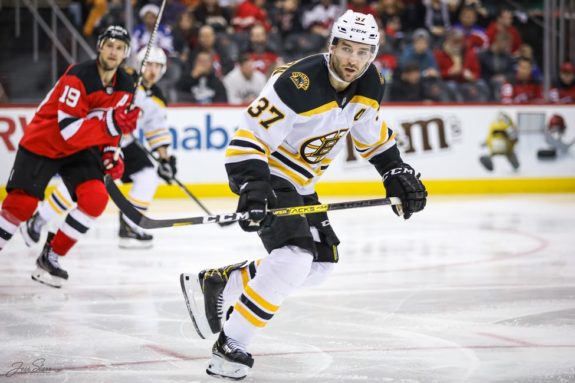As we approach the Stanley Cup Final, the NHL will announce the winners of various awards to honour those who had a stellar season in different aspects of the game. Here’s an overview of each award and why each finalist should win. From the Hart to the Calder, my analysis will unfold before the winner is announced during the semi-finals.
The Selke Trophy finalists are: Patrice Bergeron, Mark Stone, and Aleksander Barkov. All three are known for being excellent two-way players which has put them in a position to win the award for best defensive forward. Let’s start with the most tenured of the group.
Patrice Bergeron
Bergeron has the best resume of the three nominees. Although he has always been great defensively, his reputation alone earns him a nomination in most seasons, but this time, it was truly deserved. On a good Boston Bruins team with linemates David Pastrnak and Brad Marchand, Bergeron put up excellent two-way numbers this season. There is some debate about the Selke’s criteria that some argue has been skewed over the years, awarded to the best two-way player instead of the best defensive one, but I will disregard the debate for the most part here.

Out of 177 forwards – with a minimum of 625 minutes played – Bergeron had an expected goals for percentage (xGF%) of 60.06%, much higher than the average of 50%, to rank 10th among forwards and first among the finalists. He placed third among all forwards and first among finalists in expected defense goals above replacement (xDef) per Evolving-Hockey. He also placed 11th in standard expected even-strength defense goals above replacement (xEVD) and 25th in expected goals against per 60.
By most, if not all accounts, Bergeron had one of the best defensive seasons in the NHL, and the nomination is well-deserved, unlike some of the other finalists.
Mark Stone
Probably the best two-way player in the league who has yet to win the Selke, Stone is a fantastic presence at both ends of the ice. His ability to win puck battles through smart use of his stick and to block passing lanes with his excellent hand-eye coordination is almost unmatched. He doesn’t show up often in modern analytics, which makes his game difficult to judge. But, he has led the league in takeaways in three of the last five seasons, which is impressive.

He had an expected goal plus-minus per 60 (xG +/- /60) of 0.21, which was ahead of Bergeron, and while he wasn’t first in xGA/60, with a minus-0.065 compared to Bergeron’s minus-0.116, it was relatively close. Stone was also 0.001 behind Bergeron in regular goal plus-minus per 0 (G+/- /60). Stone is second to Bergeron in both xEVD and xDef among the finalists, but considering this award looks at two-way play, it could help his case that he is 4.6 ahead of Bergeron in expected goals above replacement (xGAR). He’s only 0.9 Bergeron in total defense goals above replacement (Def), which is also worth noting.
Stone has been robbed of the Selke Trophy before. However, the reason Nathan MacKinnon had such a hard time in their second-round series against the Vegas Golden Knights in the playoffs was that he was matched up with Stone, who didn’t give him any space or time in the offensive zone. I’m not against Stone winning the award this season, just as I wasn’t when Sean Couturier won last season after being snubbed a couple of years before.
Aleksander Barkov
Anyone who has watched the Florida Panthers has seen Barkov make an excellent defensive play to create a turnover and lead the rush down the ice. However, his defensive analytics outside of this season has been poor. He makes a lot of good defensive plays with his stick, but his ability to limit high-danger chances is lacking. This season though, he changed the narrative of his defensive play.

Barkov placed first in xG +/- /60, but that was mainly due to his very solid play-driving expected goals stats. His defense by xGA/60 and xDef was last among the three finalists. The gap between him and Stone was smaller than the one between Stone and Bergeron, so Barkov wasn’t much worse than either of them. He did a good job at preventing shots and placed second in Corsi against per 60 (CA/60) behind Bergeron. He also had the highest xGAR of the finalists, which counts for something given that the award is no longer awarded strictly for solid defensive play, but for both offense and defense combined.
Barkov had an excellent season and can easily take over a game with one reach of his stick. However, the analytics don’t favor him in this group, which is disappointing considering the improvements to his two-way game.
The Verdict
Although some stats favor Barkov and Stone, and they make the game look easy at both ends of the ice, but the winner has to be Bergeron. Some people are tired of him being nominated based solely on his reputation, but the numbers speak for themselves this season. That he ranks first in most analytic defensive categories says it all. Everyone has seen his ability to put his stick in the right place at the right time. While the plays he makes might not be as noticeable as Stone or Barkov, he impacts the game.

Without Bergeron and his excellent defensive play, the “Perfection Line” wouldn’t be what it is today. For him to be performing so well at 35 years old should cement him in the conversation of the best two-way players to ever take the ice. While Stone could win the Selke this season simply because he’s been snubbed in the past, Bergeron is the best option.